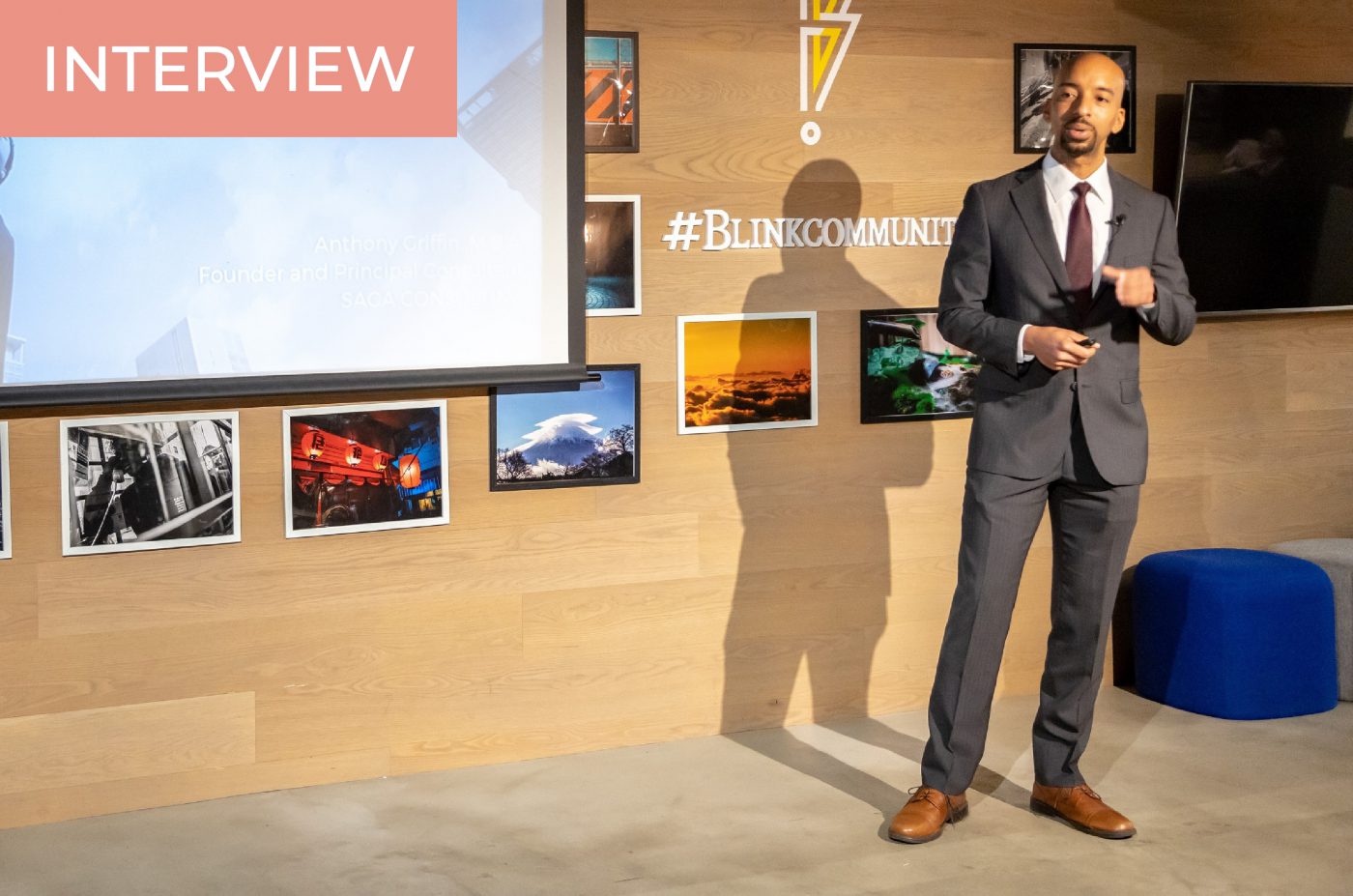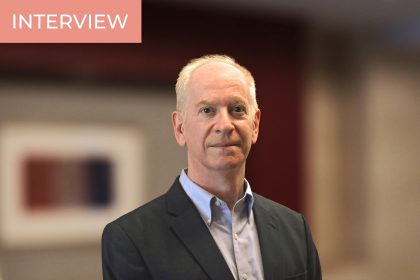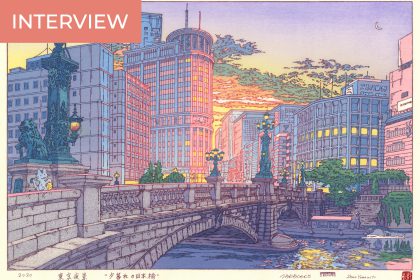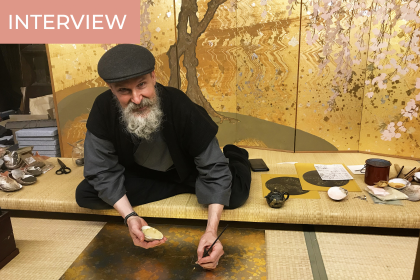Anthony Griffin is a U.S. citizen who has been living in Japan since 2009. Passionate about Japanese culture since a young age, his visits to the country as an adult convinced him to try and live here. It was the beginning of an adventure during which Japan inspired him to test his own limits and create his own brand, Saga Consulting. His love of writing has led him to share his business thoughts, Japanese language learning tips, and love of Japanese culture on his blog, and also, of course, on Kokoro Media.
Since Anthony interviewed me a few weeks ago, I decided to return the favor and give our readers the chance to get to know him better. In this interview, Anthony talks about how inspirational Japan has been for him and gives insight on his favorite topics: living in Japan, starting a business in Japan, learning the Japanese language, and pushing your own boundaries.
Moving to Japan
How long have you been living in Japan and what has led you here?
So, I have been here a little over 12 years, since January 2009. At this point, I like to say that it feels like it was my destiny to come here. [laughs]
I grew up in California, at the time when Japan was going through the bubble economy, and their products and culture were influencing the world significantly. It was exciting for me to see so much new pop culture and technology coming from a country across the Pacific Ocean.
When I became a business major in university, I had to study a foreign language for a year. And I took Japanese and did well enough to be motivated to learn even more about the culture and the country. However, I kind of took a break from Japan for several years to get some full-time work experience, and to earn my MBA. Finally, I got a job working in marketing for the city of Riverside which allowed me to take proper paid vacations.
I started traveling to Japan for my annual vacation, and after the second trip, I did not really feel like going back home: to me, that was a signal that I should try to live here. Less than a year later, in January 2009, I moved and started living and working in Japan.
I was not prepared for how long it could take and how many hoops you have to jump through for some basic things.
What advice and warnings would you give your younger self who just moved to Japan?
I do not want to give you a boring, disappointing answer, but there is not much I would change from those early days. That is because I am so risk-averse: whenever I make a big decision, I put a lot of time into researching, studying, testing, and so on. And by the time I moved to Japan, I had studied Japanese for a year in university, and I had taken a refresher course. Through that experience, I was familiar with the culture, I had already made friends here through the vacations, and I already was familiar with where I was working.
When I first moved here, I traveled as often as I could afford to do so, I spoke the language, and I was studying from day one. Overall, I am happy with my early days. However, I was not prepared for how long it could take and how many hoops you have to jump through for some basic things. At that time, in 2009, I think it took at least two months just to get internet hooked up in the apartment you moved into. I was not quite prepared for that, especially after being suddenly separated from friends and family. Getting a bank account was also an incredible procedure, as well as getting a cell phone. I was not expecting how long it would take, how much paperwork, and how many arbitrary procedures I would have to do. So, my number one piece of advice for my younger self would be to learn to be patient.
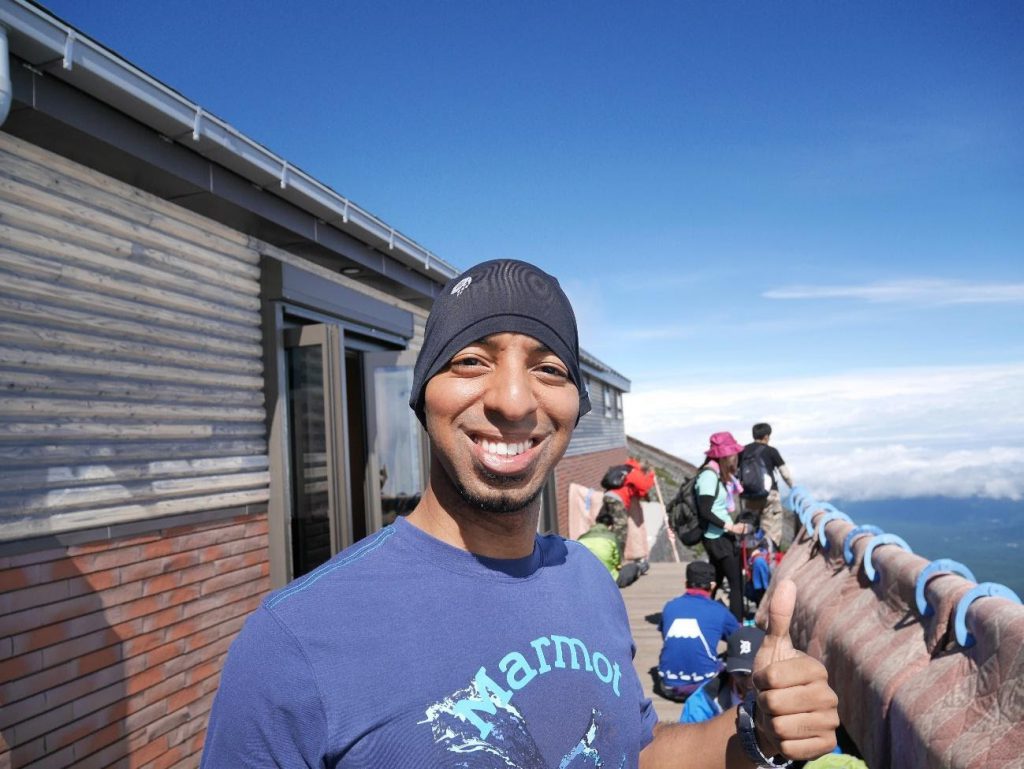
I had the same kind of experience 10 years ago. The first two months were very tiring, because I had to do all of these things. I think maybe today, things are a little bit easier. There are banks that are more friendly to foreigners, and it is easier to get a SIM card, for example.
I am glad you mentioned that it is easier now. You did not have all these options and smaller phone company players. Today, it is just a totally different landscape.
Building a Company in Japan
Being in Japan just filled my mind with new business ideas that would not have come to me in the United States.
You have built your own brand, Saga Consulting, in Japan. Was it difficult and what advice would you give to people who want to build a business in Japan?
First, I should clarify that I am a sole proprietor, which is a kind of business, but it is basically a company of one. That experience is very different from a lot of the startups that I work with, where they must get funding and invest a lot to start a business. If you want to be a sole proprietor in Japan, the process is actually very easy as long as you have the appropriate visa.
If you have a simple business idea, if you want to be a writer or a designer, for example, you can start doing your business as a side hustle without any paperwork needed. It is only when you earn a certain amount, that you must go to the tax office and file the appropriate paperwork. So, if you have a simple business idea you want to try, there is nothing stopping you.
Now, if you want to incorporate, or launch a startup, it is going to be a lot more challenging. The practical side is incredibly hard: from finding clients–for which you need a good reputation–to building strong relationships, and designing a product or service that Japanese people actually want. On top of that, you are dealing with a foreign language which brings an extra layer of complexity.
You cannot take shortcuts with those things. It took me about eight years to build and keep strong relationships before I could work independently. But I think that is the key. Two of my very valuable clients were introduced to me within my first two years in Japan, and they are still clients to this day. It is really all about building up that relationship and reputation.
On the other hand, I was so inspired by being in Japan–it just filled my mind with new business ideas that would not have come to me in the United States. So, in the end, I think the difficulties balance the opportunity.
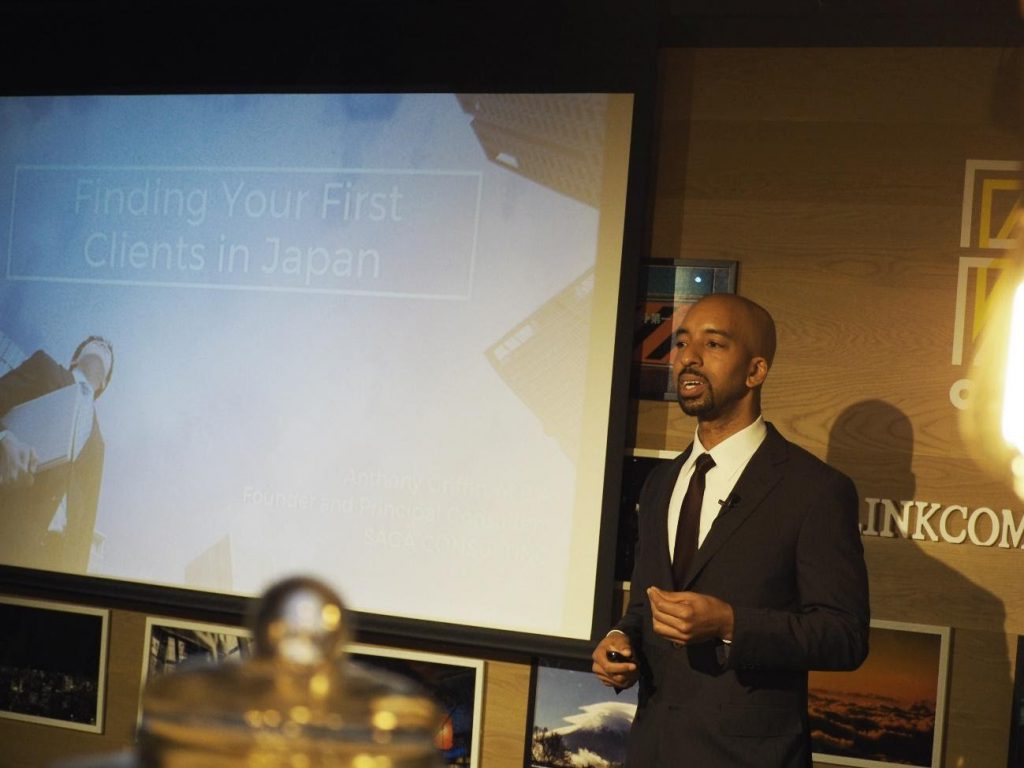
Your consulting work revolves mostly around helping Japanese companies to do business on the global scale. What are the main cultural and business differences you need your clients to understand?
I mostly work in the business-to-business space, and in that case, number one is the importance of professional, error-free writing when copywriting. Companies entering Japan and Japanese companies trying to sell to America often have the misconception that you can just take your website or content, put it in Google Translate, and then just post it. That is not enough.
When you are entering another country, you are competing with the local players, who are going to have polished websites and compelling copywriting. If you have a sloppy website, or sloppy content, that is going to reflect on your brand and make you look unprofessional. If you have a similar product to the local competition, but your website has a lot of mistakes or looks unprofessional, the consumer is not going to trust you. They are going to choose the company that can properly market itself.
My clients often ask me, ‘How do I market to America?’ My answer is: you cannot market to America as a whole. (…) You really need to get good at segmenting.
For number two, I am going to talk about America because that’s where I’m from and the market for most of my clients. You cannot treat America as one market. It is a huge country with a diverse history, all kinds of cultures, and people that are separated by geography., You also have to consider diversity in race, religion, politics, and culture. My clients often ask me, “How do I market to America?” My answer is: you cannot market to America as a whole. You must choose your demographic, what part of the country, what ethnicities and nationalities, and what income brackets you are going to include. You really need to get good at segmenting.
You also have to be professional and make sure that you do not offend someone in or outside of your target demographic. Sadly, we have seen some major Japanese companies make some pretty offensive marketing moves because they were not prepared to market to a global audience.
I have heard several of your Japanese business partners and clients describe you as ‘very polite,’ ‘considerate,’ and ‘watchful for details,’ praises that I think are not easy to earn as a foreigner in Japan. Have these traits always been a part of your character, or have you learned to develop them in a certain way?
Well, first of all, thank you, I feel relieved to hear that. [laughs] When I am interacting with clients or people, I am not thinking consciously about those behavioral traits. I feel privileged to surround myself with great people and great companies. When you do that, it becomes easy to be polite and exhibit those traits.
However, for some of those things that you mentioned, I think that is just the way my parents raised me: to respect people and work hard. Coincidentally, those values are appreciated in Japanese business culture.

When you mentioned detail-oriented, however, that is something I have been working on since I started making money from writing. I started my writing career when most of what we did was in print. And that means if you make a mistake, or an error, it goes out and stays forever, or it’s going to be very costly to fix. When I was working for the city of Riverside, I would often have to author articles and edit articles for our newsletter that was sent to every household in the city on a monthly or bimonthly basis. And those went out in print. And, sadly, if we made mistakes, the local press would pick up on them, and joke about us in the newspaper.
Since then, I have been training myself to be more detail-oriented, and I am still trying to do that, even digitally. Even though we can fix errors really quickly, with social media and being online, more people can see your content than ever before. So, being detail-oriented is something I will be working on until I die [laughs] because we can never achieve perfection. But I am going to keep struggling to get as close to perfection as possible.
Portraying Japan in a Positive Light
“I want readers overseas to experience everything through my eyes.”
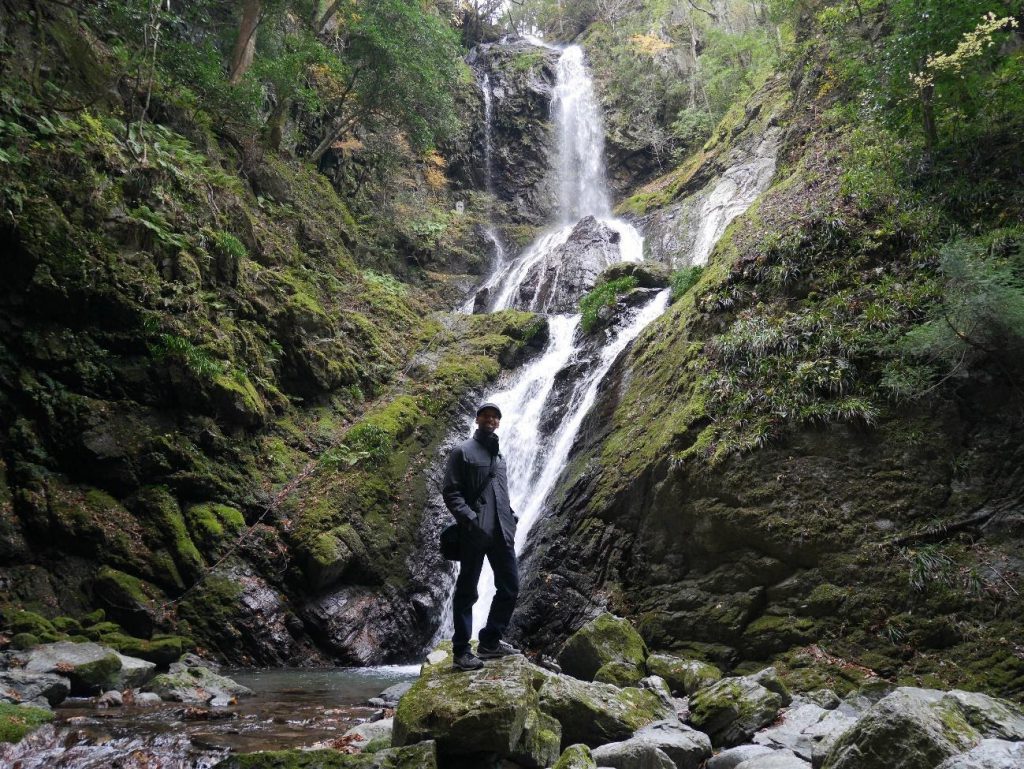
What is your relationship with writing? What has led you to write articles about Japan and its culture on top of your regular career?
My relationship with writing goes back to junior high, when I started to get consistent positive feedback about my work through my grades, and I enjoyed writing more than other subjects. That gave me a clue that maybe I should explore writing.
In college, I got my first chance to make money from my writing by writing video game reviews. My friend and coworker started a website, and we were getting paid to produce this content. By the end of our run, I had published at least 100 video game reviews, and I had been paid for that.
In graduate school, I helped another close friend start his graphic design business. Not only did I help him with the business plan, but whenever his clients needed copywriting, I was the person who would handle it. That was my first true freelancing experience. I got really excited and thought it was pretty fun.
Then, I moved to Japan and, naturally, like many foreigners, I started documenting my travels and my life in Japan, for limited audiences. That made sure that I stayed up to date on writing technology like WordPress. Most importantly, it gave me a lot of feedback on my writing, the pictures that I was taking, the videos I was making, etc. I did that for 10 years, until that kind of evolved into writing for Tadaima Japan and then Kokoro Media.
Being in Japan has opened my mind to new possibilities and given me challenges that I never knew I could overcome.
What messages would you like to convey through your articles?
What has always motivated my travel writing for Japan is to accurately portray what I am seeing or what I am experiencing. I want readers overseas to experience everything through my eyes. And, when I am interviewing someone, I want to accurately portray what the interviewee is trying to say. You mentioned that too.
Being in Japan has created so many opportunities for me–not only economically. It has opened my mind to new possibilities and given me challenges that I never knew I could overcome. So, through my writing, I kind of want to return the favor, and portray Japan in a positive light. I want to show how great this country can be.
On Kokoro Media, you are the author of many articles about learning Japanese efficiently. How would you describe your relationship with the Japanese language and what would be your most important tip for learners?
You know, I have a love-hate relationship with the language because it is incredibly difficult to learn, mainly because of kanji. It is taking me longer than I thought to achieve my goals. At the same time, the ability to write emails in Japanese, to just talk to people in the neighborhood, and understand Japanese culture on a different level is incredibly rewarding.
I feel that I will probably be studying this language for the rest of my life. That is one of the reasons I like to write about it: it helps me optimize and collect my thoughts on how to approach this language. For example, I recently read a book called “How to Take Smart Notes.” Its author says that writing is thinking, and that by writing, you can organize your thoughts and figure out problems. I think that is why I like to write about my learning process.
As far as tips, I recently wrote an article that I think contains my best advice: to leverage the Pareto principle, the 80/20 rule. First, master the 20% of Japanese that is most effective: the most frequent words, grammar points, and kanji, that will benefit whatever you are trying to do in Japan. You will find that it is going to take care of 80% of your Japanese needs.
Another thing that I have been thinking about recently, is that you might want to frontload your studying of kanji instead of approaching the language holistically. Do something like Remembering the Kanji on WaniKani, my personal favorite, and just focus most of your time there. If you are dedicated, you could probably learn all the joyo kanji in under two years. Once you get that done, everything else is going to be easier. Unfortunately, I did not do that, so I am trying to tell people to do better than I did. [laughs]
Find Your Japan
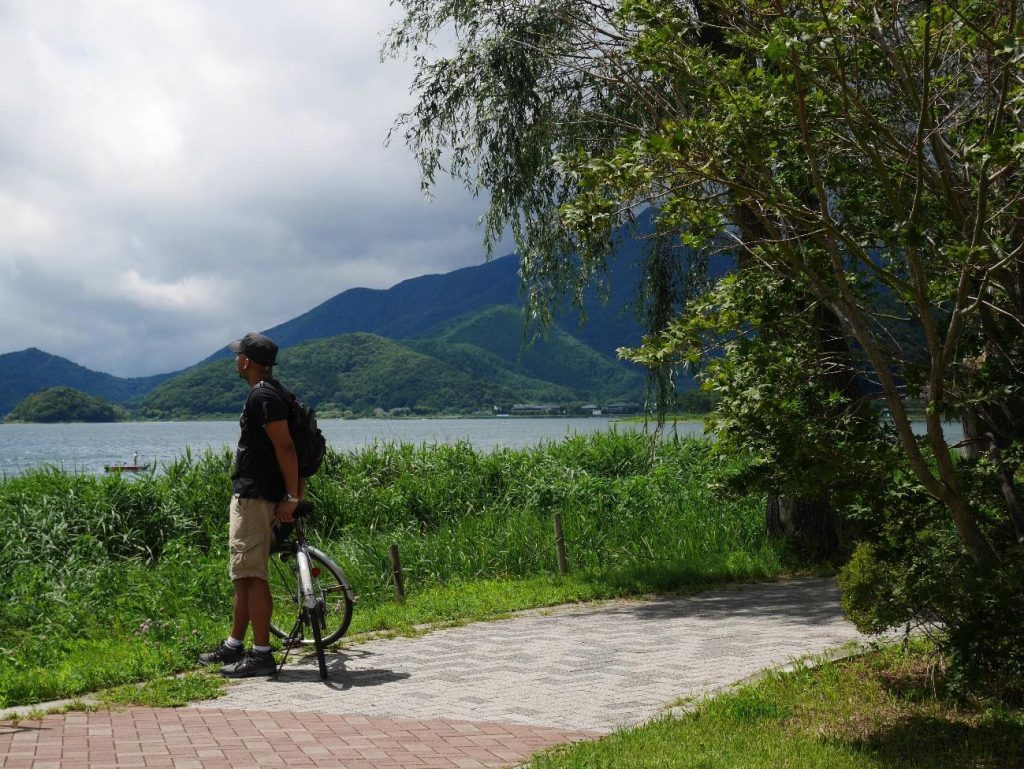
What does “Kokoro” mean for you?
If I just open my dictionary, it means “heart” and “spirit,” and so on. But if you look at our website, we try to break it down into something much deeper than that. I think my “Kokoro” has to do with pushing my limits. It is about discovering my capabilities through my own experience, instead of letting the world tell me what I can and cannot do.
When I think back about the major moments in my life, almost all of them came from doing unexpected things or trying something new or different.
That is funny because I have recently interviewed Japanese YouTuber Fumiya, and he had the same experience when he decided to go to the Philippines. People kept telling him to give up.
I think that applies to a lot of people in the world. Everyone is telling us, “This is your limit, you need to stay here; you need to do this.” And we internalize that. But you do not know your limit until you personally hit it. And you can still then get to work on figuring out ways to get around it. That ties to the value I put on personal freedom, as well.
When I think back about the major moments in my life, almost all of them came from doing unexpected things or trying something new or different. I am not telling people to go out and go crazy, but I think moving to another country for a year or two is within reason. The same goes for trying a new exercise routine, trying a new diet, or learning new skills.
Do you have a message for your readers?
This message is focused towards the Kokoro Media readers who are in another country and may be dreaming of working in Japan or living in Japan someday: Find your Japan. There are a lot of corners of the internet where everyone is just being negative about Japan all the time. Try to avoid a lot of that.
However, by the same token, do not just blindly follow whatever I say in my articles either. If you have any curiosity about Japan, reading is important, but go ahead and save money, make plans, and visit Japan before making a big commitment. When you visit, make sure it is not just a pre-planned tour. Make sure you have time to explore the country freely on your own to meet people in the neighborhoods here. It is a safe place where you can do that.
A long time ago, when one of my friends came to visit me–the same friend who ran the video game website during my college years–one of the things he did in Tokyo was to go get a haircut. He did not know Japanese, but he had a blast. So, once the pandemic is over, come to Japan and get a feel for the country. If you do, then you are going to know whether or not Japan is right for you.
Thank you, Kokoro readers.
A Path to Follow
I have known Anthony for a little more than three years now, and the first time we met, I immediately understood why colleagues were already speaking highly of him. His professionalism and the fact he never speaks before having carefully considered the matter are qualities highly regarded in Japanese business culture. That being said, this interview was an occasion for me to discover some parts of his Japan experience I had yet to know of.
I had pictured Anthony as having always been perfectly comfortable in the Japanese business world, and I had not realized the challenges he had to overcome, the self-imposed limits he decided to break through, and, overall, the power that Japan had to inspire him to be more adventurous.
Anthony’s personal story is important because it is not one of those survivorship-biased success stories we find a lot online these days. It reminds us that making a career in Japan is not easy. It takes time, effort, a lot of prior preparation, culture, and language study. And then you may achieve something that satisfies you.
Summed up that way it may sound discouraging, but I believe it is actually encouraging, in the sense that if you are gathering knowledge about Japan and its language (and I believe you are since you are visiting our website), then you are already on the right path.
If making a career in Japan is your dream, I wish that you find your Japan.

